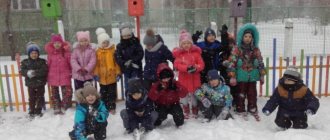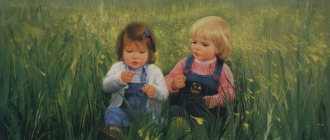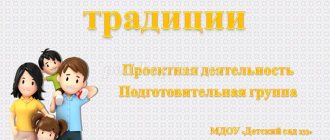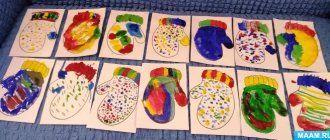Social project “Kindness around us”
#3rd grade #Teaching and methodological materials #Presentation #Class teacher #School education
Social project “Kindness around us” Project participants: 4th grade B Project leader: Smirnova Yu.P., primary school teacher MBOU “Secondary School No. 56”, Kursk Social project “Kindness around us”
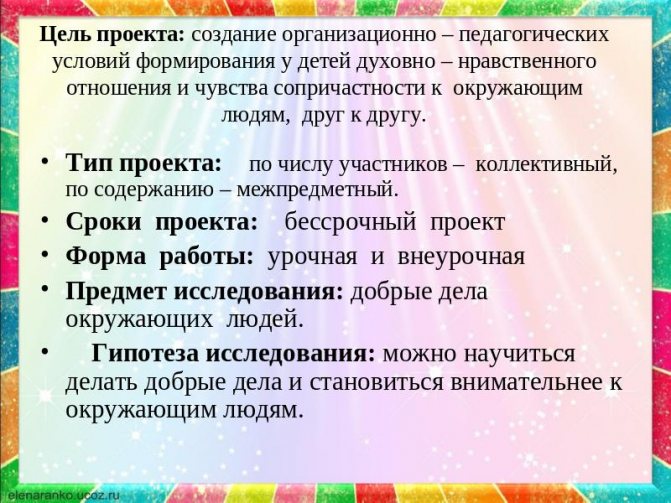
The goal of the project: to create organizational and pedagogical conditions for the formation in children of a spiritual and moral attitude and a sense of belonging to the people around them, to each other. Type of project: in terms of the number of participants - collective, in terms of content - interdisciplinary. Project duration: open-ended project Form of work: classroom and extracurricular Subject of research: good deeds of surrounding people. Research hypothesis: you can learn to do good deeds and become more attentive to the people around you.
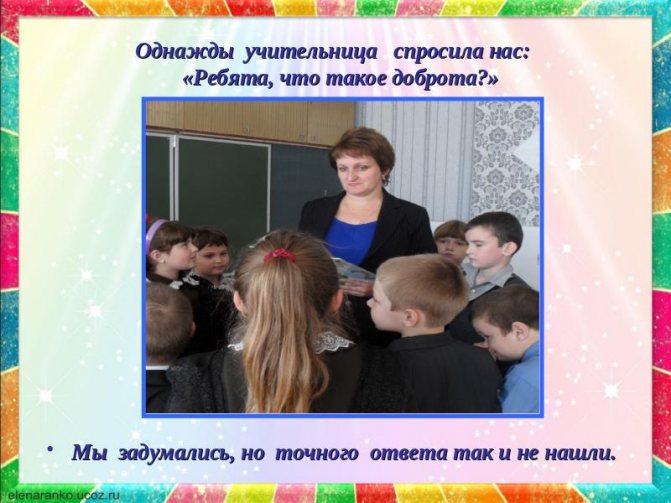
One day the teacher asked us: “Guys, what is kindness?” We thought about it, but never found an exact answer.

We wanted to know: What does the word kindness mean? How do people show kindness? How to become kind? Is kindness important in our lives?

We assumed: And if a person is kind, then he always speaks polite words. Kindness is doing good deeds or wanting to help others.
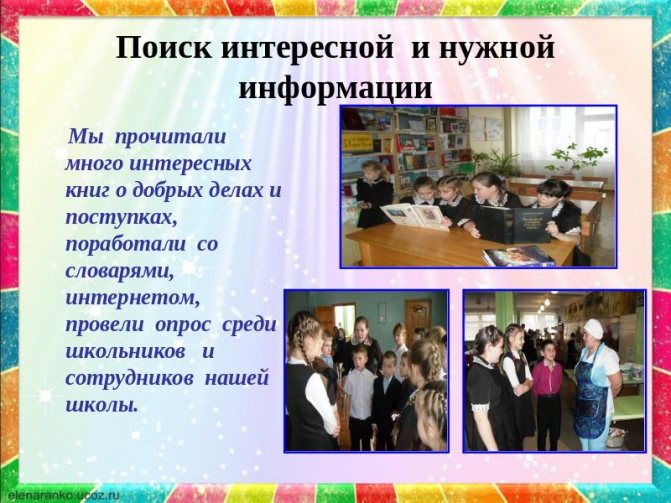
Searching for interesting and necessary information We read many interesting books about good deeds and deeds, worked with dictionaries, the Internet, and conducted a survey among schoolchildren and staff of our school.
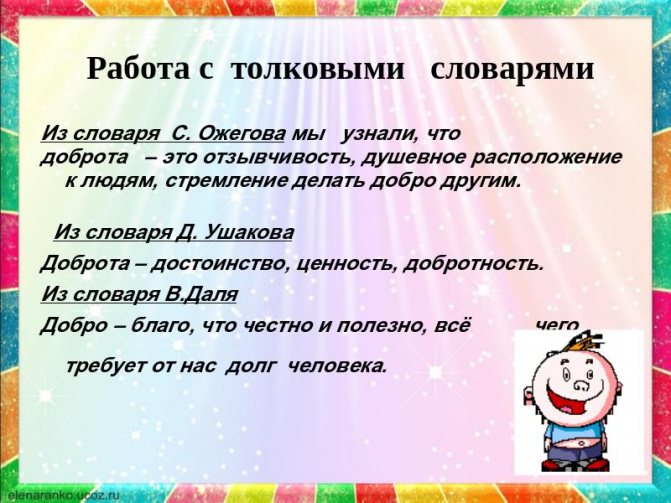
Working with explanatory dictionaries From S. Ozhegov’s dictionary we learned that kindness is responsiveness, emotional disposition towards people, the desire to do good to others. From the dictionary of D. Ushakov Kindness is dignity, value, goodness. From V. Dahl's dictionary Good is good, what is honest and useful, everything that human duty requires of us.
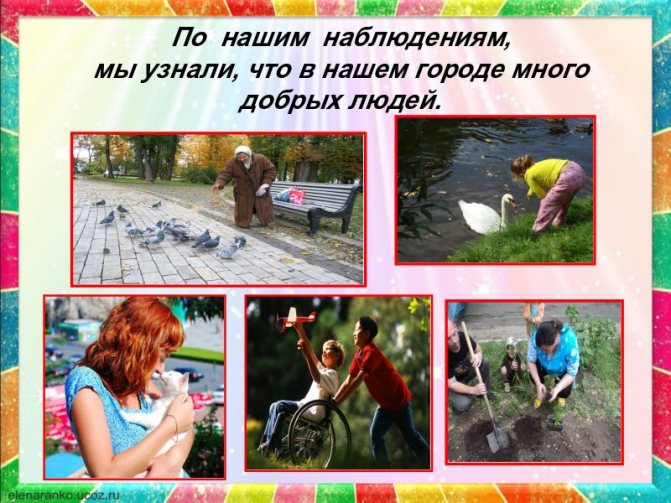
According to our observations, we learned that there are many kind people in our city.
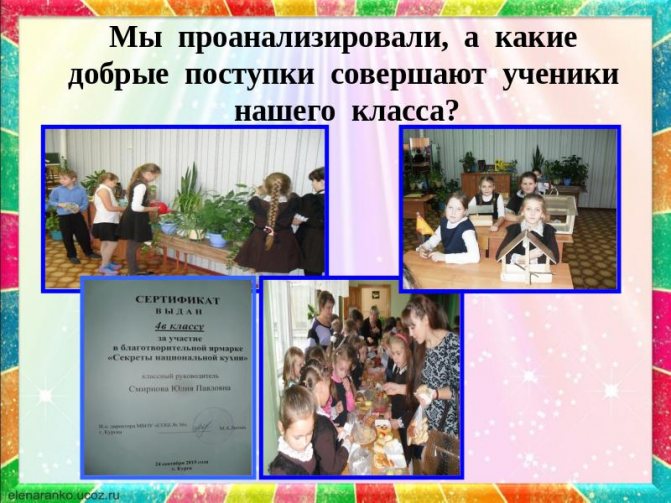
We analyzed what good deeds do the students in our class do?
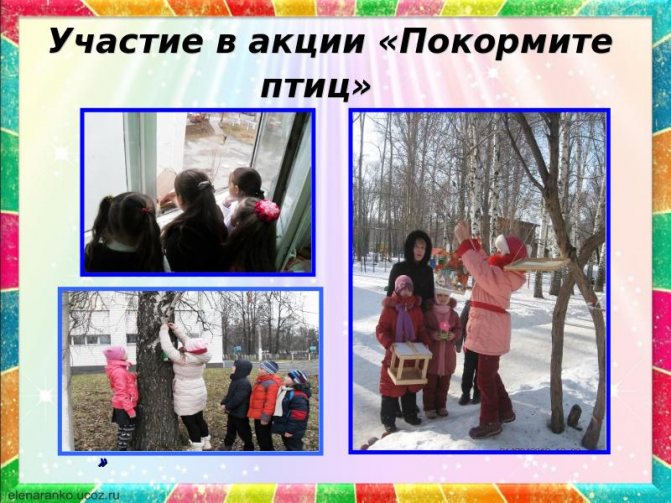
Participation in the “Feed the Birds” campaign »
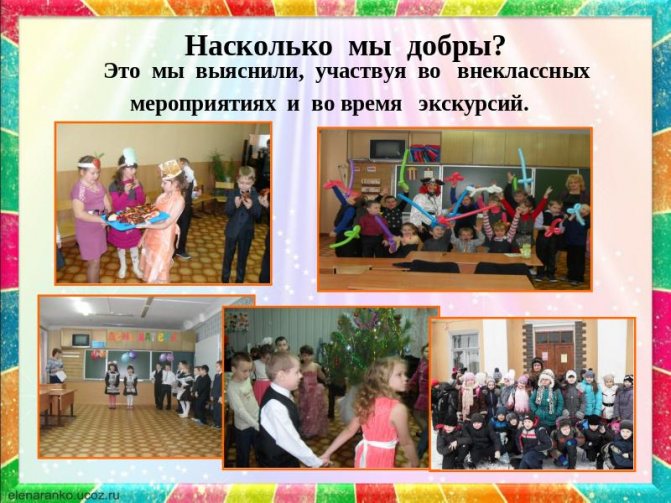
How kind are we? We found this out by participating in extracurricular activities and during excursions.
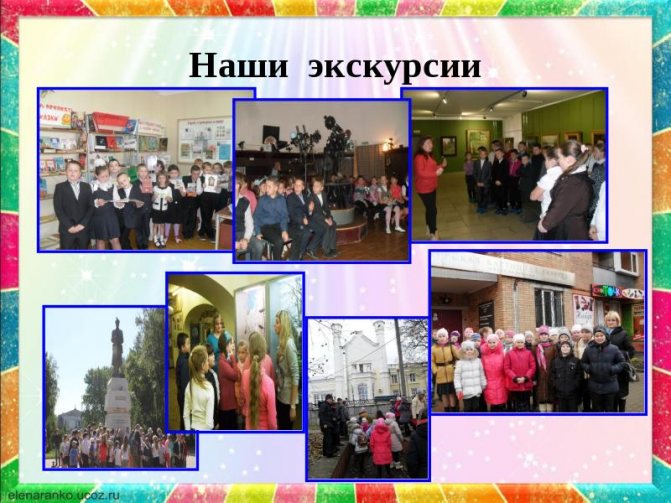
Our excursions
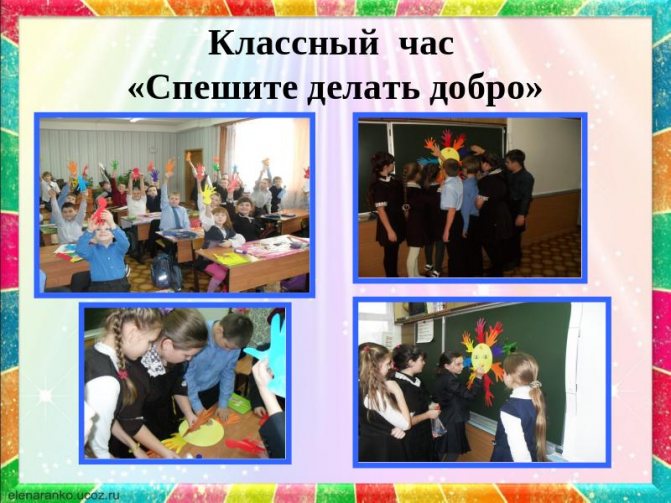
Class hour “Hurry up to do good”
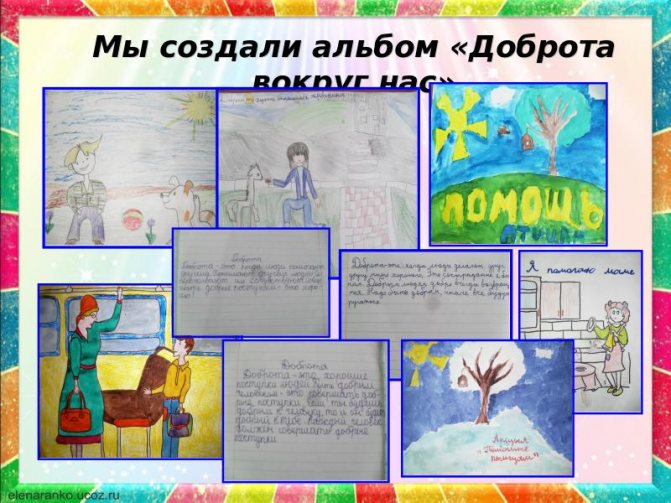
We created the album “Kindness Around Us”
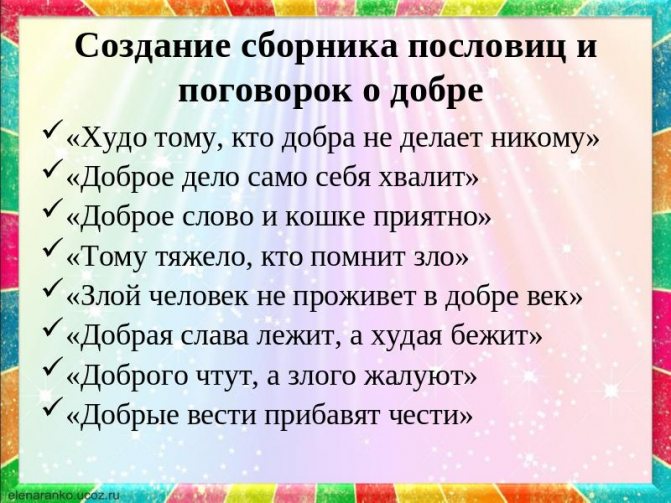
Creation of a collection of proverbs and sayings about goodness “It is bad for him who does no good to anyone” “A good deed praises itself” “A kind word is pleasant for a cat” “It’s hard for someone who remembers evil” “An evil person will not live in a good age” “Kind glory lies, but evil flees" "The good are honored, but the evil are favored" "Good news will add honor"
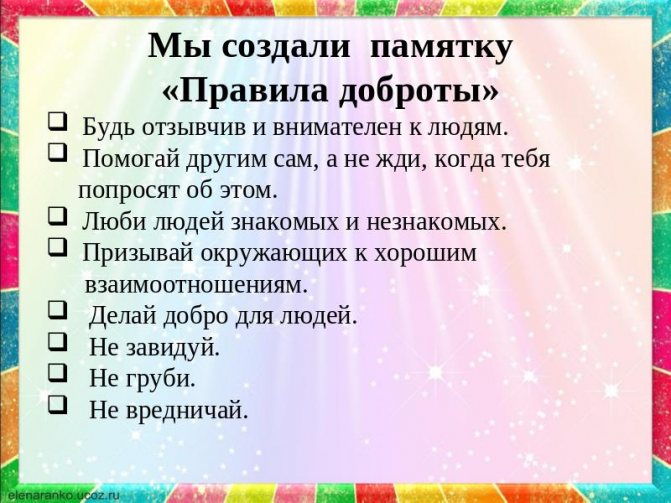
We have created a reminder “Rules of Kindness”: Be responsive and attentive to people. Help others yourself, rather than waiting to be asked to do so. Love people you know and strangers. Encourage others to have good relationships. Do good for people. Do not envy. Do not be rude. Do not be mean.
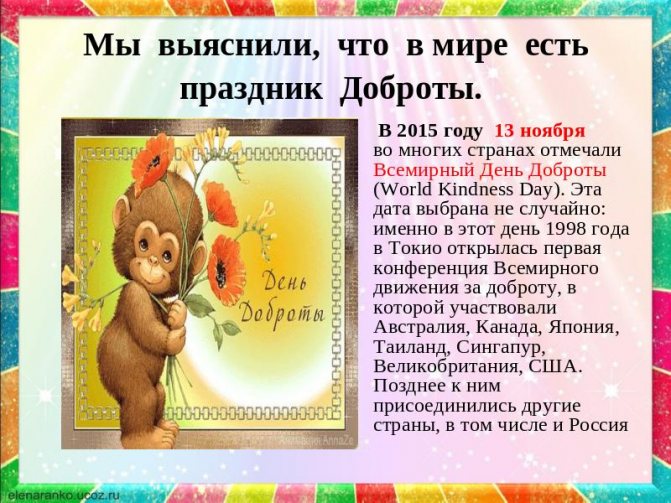
We found out that there is a holiday of Kindness in the world. In 2015, on November 13, many countries celebrated World Kindness Day. This date was not chosen by chance: it was on this day in 1998 that the first conference of the World Kindness Movement opened in Tokyo, in which Australia, Canada, Japan, Thailand, Singapore, Great Britain, and the USA took part. Later they were joined by other countries, including Russia
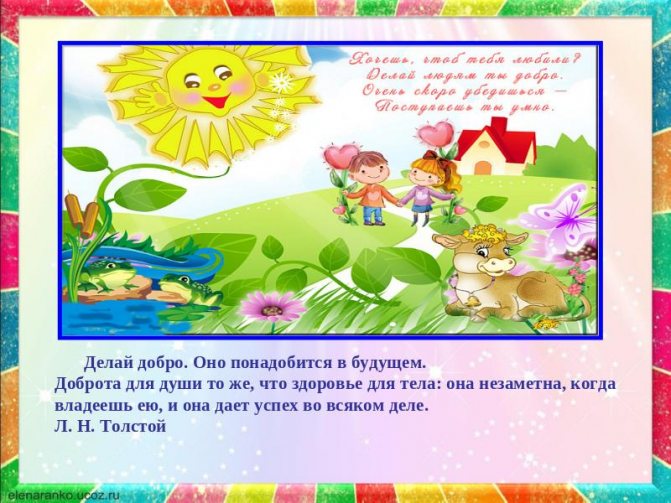
Do good. It will be needed in the future. Kindness is for the soul what health is for the body: it is invisible when you own it, and it gives success in every endeavor. L. N. Tolstoy
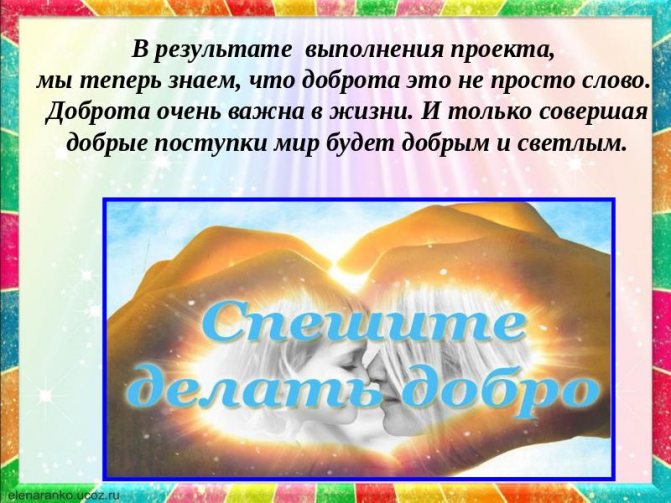
As a result of the project, we now know that kindness is not just a word. Kindness is very important in life. And only by doing good deeds will the world be kind and bright.
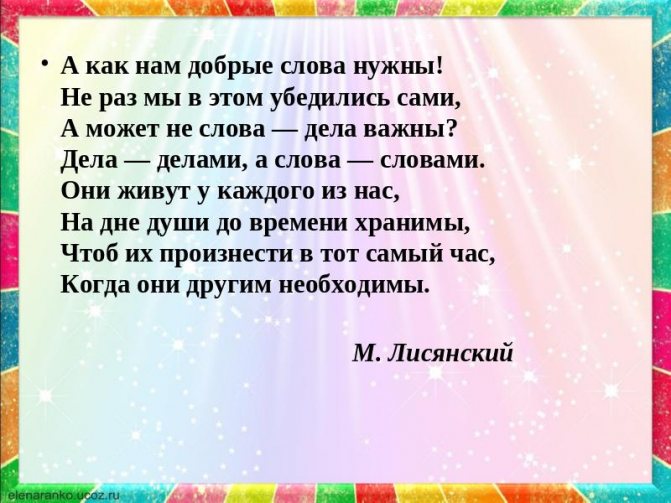
And how we need kind words! We have convinced ourselves of this more than once, Or maybe it’s not words—deeds that are important? Deeds are deeds, and words are words. They live in each of us, At the bottom of our souls they are kept until the right time, To be pronounced at that very hour, When others need them. And how we need kind words! We have convinced ourselves of this more than once, Or maybe it’s not words—deeds that are important? Deeds are deeds, and words are words. They live in each of us, At the bottom of our souls they are kept until the right time, To be pronounced at that very hour, When others need them. M. Lisyansky
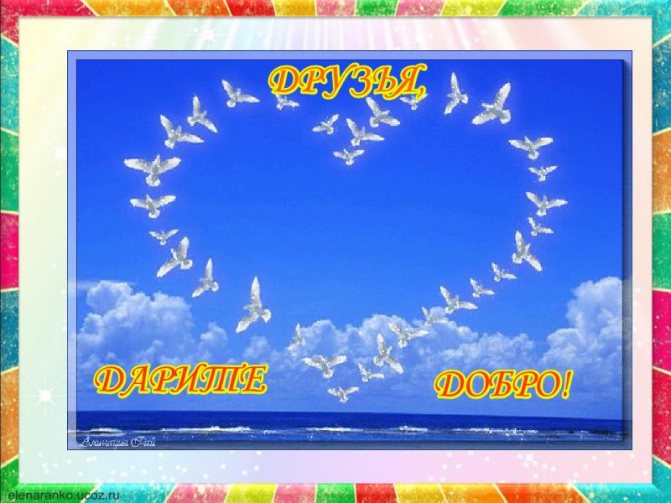
Social pedagogical project on the theme “Do good”
Project passport
The type of project is creative.
The content is socio-pedagogical.
By the number of contacts - joint activities of teachers, speech therapists, psychologists, music directors, physical education instructors, older students - preparatory groups and their parents.
In terms of time – short-term.
Project participants: pupils of MBDOU “Kindergarten No. 44 “Andreika” aged 5 to 7 years, teachers, speech therapists, physical education instructor, music directors, parents.
Project motto: Kindness will save the world!
Relevance:
What is good? This is a very easy, but at the same time difficult concept, especially for a preschooler to perceive.
Kindness is an inner feeling of a person. People who do good deeds are magic to us all. There are people who are ready to do good deeds day and night, and these are not only mothers. Of course, the mother is considered the guardian of the family. And, of course, it is the mother who plays an important role in the life of every person. The formation of relationships between a preschool child and mother is of great importance for the development of the child’s personality. Unfortunately, sometimes children associate love for their mother only with material values, and not spiritual ones.
But can only a mother do good? You and I know that there are a lot of people who do good.
To celebrate Mother's Day, we decided to combine two themes. Kindness from the mother and family, and people who bring goodness to society free of charge throughout their lives - these are volunteers.
Our project is aimed at forming friendly relationships between people, respect for one’s neighbor, and providing all possible assistance.
After all, children are our flowers, but these flowers often do not notice how they offended each other, their relatives, created some kind of conflict situation and cannot resolve it.
We will try to teach students to evaluate their actions and the actions of others.
Our project is a wonderful opportunity to reflect on goodness. Which ultimately should form an idea of universal human values and contribute to the spiritual and moral development of children.
Goal: Formation of a culture of social assistance as the most important factor in the spiritual and moral development of a child’s personality.
Tasks:
— To develop in students a positive attitude towards all people.
— Deepen children's understanding of kindness as a valuable, integral quality of a person.
— To cultivate kindness, responsiveness, friendliness, the desire to do something for other people, to benefit them.
Tasks for working with parents:
— To interest parents in the upbringing and formation of the moral culture of children. — Increase the competence of parents on the topic of the project week. — Involve families to participate in the educational process on the basis of pedagogical cooperation. — Consultations for parents on the topic of the week.
Stages of work on the project:
I. Search stage
- Determining the topic of the project, setting goals and objectives.
- Studying literature on project activities.
- Preparation of methodological literature.
II. Analytical stage
Material and technical resources necessary to complete the project: - selection of methodological and fiction literature; — selection of visual material (illustrations, posters, photographs, books, fairy tales); — didactic games; - selection of cartoons; presentations on the topic; — an exhibition of books, drawings, an exhibition of creative works of parents and children.
Necessary conditions for the implementation of the project: - interest of parents and children; — methodological developments.
III. Practical stage.
Comprehensive thematic planning on the project topic. Direct implementation in the joint activities of the teacher and the child in various educational areas to achieve the assigned tasks.
| No. | Events |
| 1 | Organized educational activities - Cognition (FCCM) - “In the world of kindness” |
| 2 | Organized educational activities artistic and aesthetic development (Drawing) - “Kindness in our hearts” |
| 3 | Organized educational activities of artistic and aesthetic development (Aesthetic education) - “Good deeds” |
| 4 | Organized educational activities of artistic and aesthetic development (Modeling) - “Bouquet as a gift” |
| 5 | Organized educational activities - Speech development (Speech development) - Composing a story based on the plot picture “True Friend” |
| 6 | Cognition (Manual labor) - “Giving joy to mother” |
| 7 | Organized educational activities artistic and aesthetic development (Drawing) - “Portrait of Mom” |
| Project activities | |
| 1 | Campaign “Give a Smile” |
| 2 | A dramatization of the fairy tale “The Stupid Mouse” by S.Ya. Marshak |
| 3 | Photo gallery “Our good deeds” |
| 4 | Workshop of good deeds “Bird feeders” |
| 5 | Thematic exhibition of drawings “Do Good” |
| 6 | Group video “Kindness in our hearts” |
| 7 | Watching the cartoon “Just Like That” |
| 8 | Creation of a book “Kind Helpers”, with statements from children about kindness |
| Final events | |
| 1 | Entertainment for children “The Kindness of Our Hearts” |
| 2 | Concert dedicated to Mother's Day |
Communication development:
Word games
“Kind word”; "Say it kindly."
Role-playing games “Family Holiday”; "Mom's Helpers"
Outdoor games
Dramatization of movements to the music “Rainbow”, “Children drew”, “Freeze”.
Didactic games
“Professions”, “Good Deeds”, “School of Etiquette”.
Listening to songs
“Strong friendship”, “It’s fun to walk together”, “MOM is the first word”.
Reading
A collection of poems and stories about mother “My beloved mother.” S.V. Mikhalkov “Bird’s Canteen” V.A. Oseev “The Magic Word”. L.N. Tolstoy “Bone” N.N. Nosov “Patch”. V.V. Bianki "Sinichkin calendar". "Friendship" (Pakistani Folk Tales). A fairy tale about goodness “Ezhinka’s Journey” (author’s). Russian folk tales.
Project effectiveness:
As a result of the implementation of our project, children have developed social, communicative, creative and organizational skills, and developed experience in moral, ethical behavior and communication.
As a result of cooperation, the children's and adult teams are united through different areas of activity.
While working on the project, we encouraged children's desire to do good deeds and good deeds, the desire to do something for others, to benefit them. They taught us to avoid quarrels and cope with negative emotions, to give in and negotiate with each other, because good deeds bring joy!
Nurturing kindness is a valuable, integral human quality. During the project, we used a variety of didactic games, read fairy tales, studied the rules of kind and polite actions, all this develops children's communication skills: the ability to listen to a friend, and show kindness.
We believe that the activities carried out under the project should continue after its completion. Many people care about us, they give us generously, but they also expect from us, and we have enough strength to do good to people. We can live with dignity in our difficult world only by learning to stick together, support, appreciate and respect each other.
Kindness comes and a miracle happens,
all the wonders of the earth come from human kindness!
